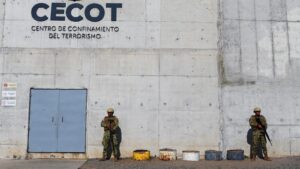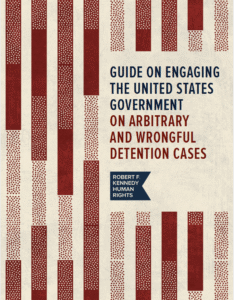On US Hostage and Wrongful Detainee Day, RFK Human Rights calls on the US government to take urgent action to address arbitrary detention globally. Increased coordination within the government; transparency of processes and clear communication with family members; as well as support for global efforts to address arbitrary detention will make for a stronger US engagement on the issue.
Authoritarian regimes around the world have deployed arbitrary detention as a tool of repression against human rights defenders, opposition leaders, and government critics. Similarly, such regimes, including Iran, Russia, Afghanistan, Venezuela, and China, have arbitrarily detained US persons – citizens and lawful permanent residents – in order to compel certain actions or leverage the United States.
While acknowledging the significant efforts of the Biden Administration in bringing home over 60 previously wrongfully detained persons in the last three years, there are more US persons still arbitrarily detained abroad. At the time of this writing, there are at least 59 US persons designated by the US state department as wrongfully detained under the Robert Levinson Act. These include: Zack Shahin, who has been held by the United Arab Emirates for 15 years, Ryan Corbett held by the Taliban in Afghanistan and Evan Gerskovich who remains detained in Russia. The US government must double their efforts to bring them home.
Other cases face the additional complication of the US government’s failure to make an official “wrongful detention” designation on their case. A “wrongful detention” designation, determined by the Secretary of State, increases prioritization and resources devoted to the case. Additionally, “wrongful detention” cases are assigned to the Special Envoy for Hostage Affairs (SPEHA), the lead government official on hostage and wrongful detention cases. For example, Cambodian-American human rights activist, Theary Seng, has been arbitrarily detained in Cambodia since June 2022. However, the US government has failed to make a wrongful detention determination in her case with little transparency in the decision-making process. Without the wrongful detention determination, there is a lower likelihood for meaningful US action on her case. Similarly, Vladimir Kara-Murza, a Russian pro-democracy advocate and US national, has been arbitrarily detained since April 2022 and meets 10 out of the 11 criteria for a wrongful detention designation. However, the US government has failed to make a determination on his case.
The Bring Our Families Home Campaign, a US-based advocacy group of families with loved ones wrongfully detained abroad, as well as the James Foley Foundation, an organization that advocates for the return of wrongfully detained US nationals, have highlighted the challenges that families of wrongfully detained persons have faced in their campaign to free their loved ones. These challenges include ensuring that cases receive proper prioritization with high level US government officials, delays in decision-making by government officials, and a lack of proper communication and coordination between government departments and with families of those detained. Further, some families have experienced a lack of coherent procedures, coordination, and awareness around the handling of arbitrary detention cases by Consular Affairs. More broadly, some families have raised concerns about the lack of the use of sanctions for arbitrary detention cases and concerns that US foreign policy objectives are prioritized over efforts to free those arbitrarily detained.
As part of their efforts to bring home US persons and protect them while abroad, the US government should increase transparency and communication around its wrongful detention determinations and increase high-level engagement in wrongful detention cases to ensure that cases are receiving the attention necessary to be resolved as quickly as possible. Further, the government needs to clarify the roles of the actors involved in arbitrary detention cases, including designating a specific office within the State Department for arbitrary detention cases.
In addition to its efforts to reunite US persons detained abroad with their families, growing the legislative and other tools for addressing arbitrary detention abroad would be a great way for the US to holistically address wrongful detention. For example, Congress should pass the recently introduced Human Rights Defender Protection Act, which has a number of provisions that would help protect human rights defenders around the world from arbitrary arrest and detention. At the same time, increasing US involvement at the international level with the UN and other regional bodies and mechanisms will help arbitrary detention cases more broadly but will also benefit individual wrongful detention cases.
Working to end arbitrary detention allows for enabling environments to foster a stronger civil society. A strong, protected civil society is essential to upholding democracy and stands as a bulwark against authoritarianism. This Hostage and Wrongful Detainee Day, the US government has an opportunity to use its leverage and resources to uphold democracy and ensure that those arbitrarily detained are reunited with their families and get justice for the violations committed against them.




